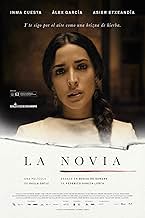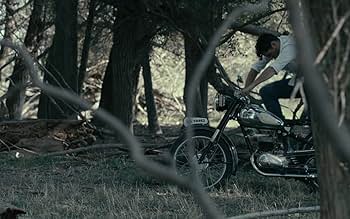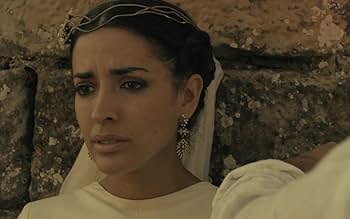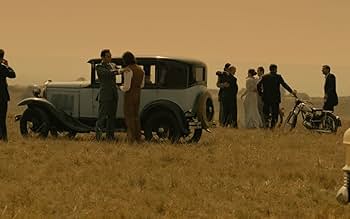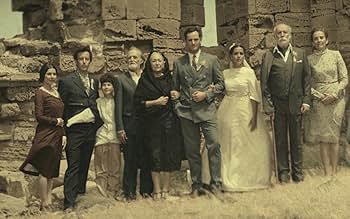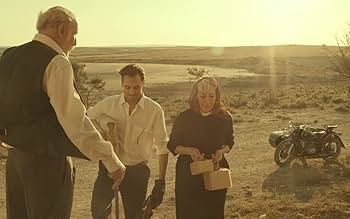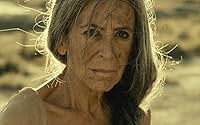AVALIAÇÃO DA IMDb
6,6/10
3,6 mil
SUA AVALIAÇÃO
Adicionar um enredo no seu idiomaAs the Bride and the Groom prepare for the wedding in the pale desert, a tale of unappeased desires, forbidden yearnings, and conflicted choices unfolds. Now, three lovers stand powerless be... Ler tudoAs the Bride and the Groom prepare for the wedding in the pale desert, a tale of unappeased desires, forbidden yearnings, and conflicted choices unfolds. Now, three lovers stand powerless before the true nature of man. Is fate unavoidable?As the Bride and the Groom prepare for the wedding in the pale desert, a tale of unappeased desires, forbidden yearnings, and conflicted choices unfolds. Now, three lovers stand powerless before the true nature of man. Is fate unavoidable?
- Direção
- Roteiristas
- Artistas
- Prêmios
- 19 vitórias e 34 indicações no total
Carmela Labordeta
- Novia Joven
- (as Carmela del Campo)
- Direção
- Roteiristas
- Elenco e equipe completos
- Produção, bilheteria e muito mais no IMDbPro
Avaliações em destaque
"At the heart of all great art is an essential melancholy", Spanish dramatist Federico Garcia Lorca's own words which also aptly describe La Novia, a new filmic adaptation by Paula Ortiz of his 1932 play, Bodas de Sangre (Blood Wedding), a tragedy which details a bride's indecision when she is torn between her newly-wedded husband, and her lover. I went to see this film at a Spanish cinema in Cadiz this week with friends, and I was not at all disappointed. Although I have never studied this particular play, I am quite familiar with Lorca's other work, having analysed his Romancero Gitano (Gypsy Poetry) at University and his equally influential play, La Casa de Bernarda Alba (The House of Bernarda Alba), at Grammar School. Throughout his work, Lorca's sympathy is always with the lower classes, from which come his protagonists. Lorca's own story is an interesting and melancholic one, coming from a wealthy farming background in Andalucia, and growing to dislike his status of wealth, and identifying instead with the lowly.
Not only was Lorca troubled by his own social identity, he was also homosexual, which, you will see, adds another dimension to his written work and which, along with his status as a political dissident in the Spanish Civil War, led to his brutal assassination at the hands of the Civil Guard. I digress... La Novia is a beautiful film which makes wonderful use of long shots to capture the warm, bare, aridity of Spanish countryside, almost a metaphor for death and devastation which the transgression brings in the story. It was, I imagine, almost a given that this film would win this year's Goya Award for Cinematography, with thanks to Miguel Amoedo. For the average film-goer, the plentiful, expressive shots may lag, and may be seen as "art for art's sake". All the same, one cannot deny the awe they inspire. In terms of the acting, Inma Cuesta is wonderful in the part of the bride, and often looks strikingly like a young Penelope Cruz. Equally great are the bride's love interests; Asier Etxeandia, who plays the husband; and Alex Garcia, who plays Leonardo, the lover. Spanish film aficionados will also be able to recall Luisa Gavasa, a stalwart of Spanish cinema, who stuns with her performance as the husband's mother - a character beset with horrific premonitions of a disastrous marriage. The music, by Shigeru Umebayashi, is also stirring.
Lorca also said in his lifetime that "In Spain, the dead are more alive than the dead of any other country in the world." This new (filmic) lease of "life" for Lorca is clear proof of this statement. As I have already seen, Spain is a country which refuses to forget its past, literary, filmic, or otherwise.
Not only was Lorca troubled by his own social identity, he was also homosexual, which, you will see, adds another dimension to his written work and which, along with his status as a political dissident in the Spanish Civil War, led to his brutal assassination at the hands of the Civil Guard. I digress... La Novia is a beautiful film which makes wonderful use of long shots to capture the warm, bare, aridity of Spanish countryside, almost a metaphor for death and devastation which the transgression brings in the story. It was, I imagine, almost a given that this film would win this year's Goya Award for Cinematography, with thanks to Miguel Amoedo. For the average film-goer, the plentiful, expressive shots may lag, and may be seen as "art for art's sake". All the same, one cannot deny the awe they inspire. In terms of the acting, Inma Cuesta is wonderful in the part of the bride, and often looks strikingly like a young Penelope Cruz. Equally great are the bride's love interests; Asier Etxeandia, who plays the husband; and Alex Garcia, who plays Leonardo, the lover. Spanish film aficionados will also be able to recall Luisa Gavasa, a stalwart of Spanish cinema, who stuns with her performance as the husband's mother - a character beset with horrific premonitions of a disastrous marriage. The music, by Shigeru Umebayashi, is also stirring.
Lorca also said in his lifetime that "In Spain, the dead are more alive than the dead of any other country in the world." This new (filmic) lease of "life" for Lorca is clear proof of this statement. As I have already seen, Spain is a country which refuses to forget its past, literary, filmic, or otherwise.
Based on the old Spanish play about a wedding tragedy. It all sets in the rural Spain and tells the story of a bride who involved in a love triangle. It takes us back to her childhood day to reveal us her crush on one of two friends, but feudal between the friends families puts her in a tight spot. Especially as growing up knowing she has to choose one of them to marry. Finally the time comes to that, the day is set for the big occasion, but an unexpected twist brings a chaos during the celebration and the old rivalry awakens among the young generation.
It was a little dull narrative, mostly because of the quietness and lack of depth in both the character explorations and the story. I might say it is only a finishing touch work, we can't get any details we want for a better understanding, especially the past events remains slightly mysterious like how it all began. That's fine, because they thought they chopped away the boring stuffs, and yes they did, yet that did not bring any good result either.
Anyway, this film's focus was the three friends who grew up together, so this story is only about what happens around them. Beside them, the old woman who often appears is a puzzle that's need to be explained. But I assumed she's kind of witch who manipulating the peoples mind to go against each other.
Since it revolves on a wedding event, I was desperately looking forward the ceremony to begin. That's the other reason I felt letdown for it to delay. Until then the pace was too slow to keep myself engaged with this, but once the celebration began, it lit up my mood and followed by the conclusion that came with a light speed. So I kind liked the third act in the entire narration and according to me, that's the best part of the film.
"Bitterness is the worst punishment of all."
There's nothing much happens in the story section, we can easily know what's coming up next after the each scene. Because like I said, there's no great developments, everything was about getting ready for the marriage and during the marriage. It is like learning everything about it prior to the watch, yet the final scene, the solution was stronger than I expected. For an end like that I expected tearjerker atmosphere. The emotions showed between the characters, but for the viewers those are ineffective.
Shot in the cool places, I mean it looked like a semi-desert that did not bring the Spanish atmosphere of my knowledge, but blended well with the story. The character executions were fine, even the direction was good, but the writing was a disappointment. This 80 year old story needed a serious update, because the presentation was very stylish, but the tale was so simple. Yes, it looks so simple to follow, but complicated to fully understand it.
Just keep in mind that it is not a romance nor a revenge film, but a slice of equal both. About other things as well like love, life, family, culture, especially the three main characters linked with, such as the bride's choice, the groom's fate and the their friend's deception. This is definitely not an entertaining film, not for people like me, but what I call it is a story to decode. Like in the line of 'Enemy', 'Upstream Color', 'Borgman' et cetera. There're lot more about it than what actually the story tells, but only discussing with others who had watched it will bring the details out. Honestly, I was not very impressed with this, certainly not a bad film to ignore it completely.
6½/10
It was a little dull narrative, mostly because of the quietness and lack of depth in both the character explorations and the story. I might say it is only a finishing touch work, we can't get any details we want for a better understanding, especially the past events remains slightly mysterious like how it all began. That's fine, because they thought they chopped away the boring stuffs, and yes they did, yet that did not bring any good result either.
Anyway, this film's focus was the three friends who grew up together, so this story is only about what happens around them. Beside them, the old woman who often appears is a puzzle that's need to be explained. But I assumed she's kind of witch who manipulating the peoples mind to go against each other.
Since it revolves on a wedding event, I was desperately looking forward the ceremony to begin. That's the other reason I felt letdown for it to delay. Until then the pace was too slow to keep myself engaged with this, but once the celebration began, it lit up my mood and followed by the conclusion that came with a light speed. So I kind liked the third act in the entire narration and according to me, that's the best part of the film.
"Bitterness is the worst punishment of all."
There's nothing much happens in the story section, we can easily know what's coming up next after the each scene. Because like I said, there's no great developments, everything was about getting ready for the marriage and during the marriage. It is like learning everything about it prior to the watch, yet the final scene, the solution was stronger than I expected. For an end like that I expected tearjerker atmosphere. The emotions showed between the characters, but for the viewers those are ineffective.
Shot in the cool places, I mean it looked like a semi-desert that did not bring the Spanish atmosphere of my knowledge, but blended well with the story. The character executions were fine, even the direction was good, but the writing was a disappointment. This 80 year old story needed a serious update, because the presentation was very stylish, but the tale was so simple. Yes, it looks so simple to follow, but complicated to fully understand it.
Just keep in mind that it is not a romance nor a revenge film, but a slice of equal both. About other things as well like love, life, family, culture, especially the three main characters linked with, such as the bride's choice, the groom's fate and the their friend's deception. This is definitely not an entertaining film, not for people like me, but what I call it is a story to decode. Like in the line of 'Enemy', 'Upstream Color', 'Borgman' et cetera. There're lot more about it than what actually the story tells, but only discussing with others who had watched it will bring the details out. Honestly, I was not very impressed with this, certainly not a bad film to ignore it completely.
6½/10
Beautiful and fantastic (as in fantasy!) photography and scenery: the greatest contribution made by cinematography in the direction of Paula Ortiz to the already thriving "Bodas de Sangre" play by Federico Garcia Lorca.
A play full of strong and deep poetry in which the destiny of the characters are controlled and dictated by their deepest emotions as if these emotions were fierce Gods that are far beyond any human control or law, and just as the ancient Gods of most mythologies played with the destiny of the mortals as if leafs in the winds, the emotions portrayed in this film do the same to the lives of every single character in this film: merciless, relentlessly.
Talking specifically about the film, one of the new 'extensions' added in the film and absent in the play, is the great metaphor of the crystals all across the film. Lorca use the word 'cristal' and 'vidrio' plenty of times in the play without referring to an actual crystal but as literary resource, and the development of this idea in images is magical and beautiful.
A downside of the film, for those who cannot understand Spanish, is the very lame translation in the English captions. I do speak Spanish as my native tongue but I had to turn the captions on at some moments because they whisper a lot and some pronunciations are difficult to grasp. As I said, this film is full of delightful poetry, not only visually but literally and is a shame that the translator didn't seem to notice that, as a result some of the most brilliant moments of the movie become plain and bland if reading the English translation. There is even one moment in which the translation express exactly the opposite to the original meaning.
Not taking in great consideration this last thing, La Novia is an amazing film that I would recommend to everyone except to those that faint when they see blood.
A play full of strong and deep poetry in which the destiny of the characters are controlled and dictated by their deepest emotions as if these emotions were fierce Gods that are far beyond any human control or law, and just as the ancient Gods of most mythologies played with the destiny of the mortals as if leafs in the winds, the emotions portrayed in this film do the same to the lives of every single character in this film: merciless, relentlessly.
Talking specifically about the film, one of the new 'extensions' added in the film and absent in the play, is the great metaphor of the crystals all across the film. Lorca use the word 'cristal' and 'vidrio' plenty of times in the play without referring to an actual crystal but as literary resource, and the development of this idea in images is magical and beautiful.
A downside of the film, for those who cannot understand Spanish, is the very lame translation in the English captions. I do speak Spanish as my native tongue but I had to turn the captions on at some moments because they whisper a lot and some pronunciations are difficult to grasp. As I said, this film is full of delightful poetry, not only visually but literally and is a shame that the translator didn't seem to notice that, as a result some of the most brilliant moments of the movie become plain and bland if reading the English translation. There is even one moment in which the translation express exactly the opposite to the original meaning.
Not taking in great consideration this last thing, La Novia is an amazing film that I would recommend to everyone except to those that faint when they see blood.
Clebras and Rgfraiz should probably stick to blood and gore Hollywood made crap and the ever overrated Tarantino. This is a beautiful movie which speaks many idioms and yet no particular language because you have to decipher it yourself and it relies on one's own experience of life, love, desire, valid or repressed and forbidden to associate with this movie and its author. And with the book in particular. Every single choice whether it be the location(the DRY WHITE desert) to the houses which look more like ruins to the underlying stories. There is more than just a blood feud between them and the story with La Novia's mother which none of the above have understood and the reluctance of Le Novio's mother for her son to marry this particular woman......etc. There is just an immensity of codes and ciphers that need to be heard, seen and understood to appreciate this film,i.e CULTURE. Which to my despair seems to be more and more lacking nowadays. Better watched and understood in Spanish, including the dialectic words used. Or read the book before watching the film. Agree, not for everyone. But good movie. And Inma Cuesta is so good.
This movie is a wonderful representation of Lorca's work and imagery. Full of metaphors, great music, and scenes.
Você sabia?
- CuriosidadesDirector Paula Ortiz cares immensely about the artistry of the shots and takes, that's why the cast usually had to act through adverse or unpleasant environment conditions. For example, the scene when the bride sings "la Tarara" was filmed in the middle of the desert of Los Monegros at 5 a.m. Actors also had to deal with strong wind (cierzo), blinding light or mosquitoes, or even against the clock filming when the scenes happened at sunset.
- Erros de gravaçãoThe groom chases the unfaithful bride on a BMW R25/2, formerly seen in the film with a sidecar. When he arrives, he rides an unidentified motorcycle (could it be a BSA?) which stalls.
Principais escolhas
Faça login para avaliar e ver a lista de recomendações personalizadas
- How long is The Bride?Fornecido pela Alexa
Detalhes
- Data de lançamento
- Países de origem
- Central de atendimento oficial
- Idioma
- Também conhecido como
- The Bride
- Locações de filme
- Empresas de produção
- Consulte mais créditos da empresa na IMDbPro
Bilheteria
- Orçamento
- € 1.187.147 (estimativa)
- Faturamento bruto mundial
- US$ 1.779.966
- Tempo de duração1 hora 36 minutos
- Cor
Contribua para esta página
Sugerir uma alteração ou adicionar conteúdo ausente


![Assistir a Tráiler [OV]](https://m.media-amazon.com/images/M/MV5BMzg3YWM0YjAtNDg2ZC00ZGE0LWJhYzMtNzg3NjBmYTcxY2FhXkEyXkFqcGdeQXRyYW5zY29kZS13b3JrZmxvdw@@._V1_QL75_UX500_CR0)
![Teaser Tráiler [OV]](https://m.media-amazon.com/images/M/MV5BNTVjMzNlNGEtMDNhNi00MGY1LTgxNzUtZDc3YjA2NGUyODE0XkEyXkFqcGdeQXRyYW5zY29kZS13b3JrZmxvdw@@._V1_QL75_UX500_CR0)
